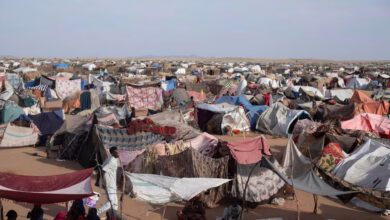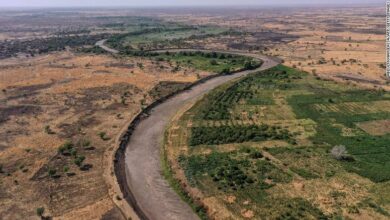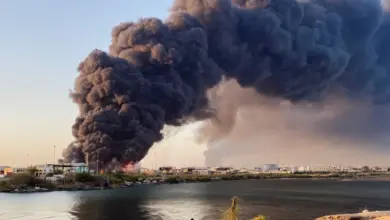Juba, Sudan – Northern Sudan's seizure of a contested border region is an act of war, a spokesman for the Southern Sudanese army said Sunday, raising fears that fighting over the town could re-ignite a civil war between the north and south.
Northern forces with tanks occupied the disputed town of Abyei on Saturday night, scattering southern troops that were there as part of a joint security unit, said southern officials and a UN spokeswoman. Khartoum-based state television cited unnamed military sources who said the army was in full control of the situation in Abyei.
Both north and south claim the fertile region, which lies near several important oil fields. Hollywood actor George Clooney set up a project to monitor the area by satellite, fearing it could be a flash point that could draw the region back into civil war.
The north's seizure of the town follows several days of fighting and bombing and drew immediate condemnation from the US government.
"We didn't declare war," said southern army spokesman Col. Philip Aguer. "The [ruling Sudanese] National Congress Party and the Sudan Armed Forces declared war on us."
Southern Sudan fought the north for more than two decades in a brutal war that claimed more than 2 million lives and forced more than 4 million people to flee their homes. A peace deal in 2005 offered the south the chance for independence and it overwhelmingly voted to secede in a January referendum. It is due to become the world's newest country in less than two months but the Abyei violence threatens to further destabilize an already volatile region.
Aguer said southern troops stationed in Abyei were overrun and scattered after the north conducted two days of aerial bombardments, focusing on a bridge where southern reinforcements would have entered.
The southern army "will maintain the status quo," he said, while it waits for the decision of the southern government on how best to respond.
Aguer called for the United Nations Mission in Sudan "to protect the people of Abyei," saying that the northern government intends to "displace civilians and commit human rights violations as they did in Darfur," Sudan's western region where a civil war broke out in 2003.
Several members of the Abyei government were missing, he said.
"There has been a fighting mood in Khartoum," said Southern Sudanese Minister of Information Barnaba Marial Benjamin, referring to the capital of northern Sudan. "We cannot accept this fighting mood to continue … the event is a long-term plan done by the government of Khartoum to disrupt and carry out an invasion."
Aid group Doctors Without Borders said in a statement the entire population of Abyei fled Saturday morning after the bombing raids, gunfights and mortaring. One mortar exploded in a UN compound but there were no casualties.
There were at least 15 northern tanks in Abyei, UN spokeswoman Hua Jiang said Saturday night.
The massive escalation in the most volatile spot along Sudan's contested north-south border came as the United Nations Security Council began a four-day visit to Sudan. The Council's scheduled visit to Abyei has been canceled because of the violence but they are due to make a public statement in Khartoum later on Sunday.
The US condemned the offensive on Saturday, saying Thursday's attack by southern forces on a UN was deplorable but the north's response "disproportionate and irresponsible."
"The actions being taken by the government of Sudan are blatant violations of the Comprehensive Peace Agreement and threaten to undermine the mutual commitment of the CPA parties to avoid a return to war," the White House statement said.
It called on Sudan's military to cease its offensive in Abyei and withdraw its forces. Failure to do so could set back the process of normalizing US-Sudanese relations, the statement warned.
The south is mainly animist and Christian and its people are linguistically and ethnically linked to sub-Saharan Africa. The north is overwhelmingly Muslim and many members of the government consider themselves Arabs. Most of Sudan's oil is in the south but the pipeline needed to export it runs through northern territory to a northern-held port.



